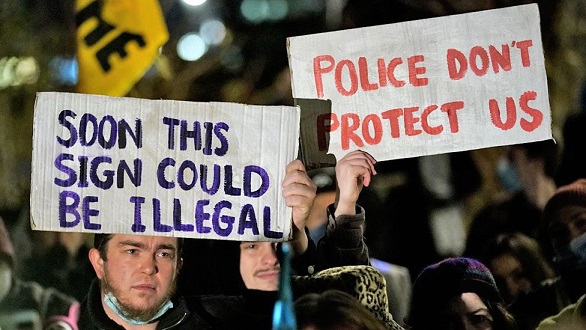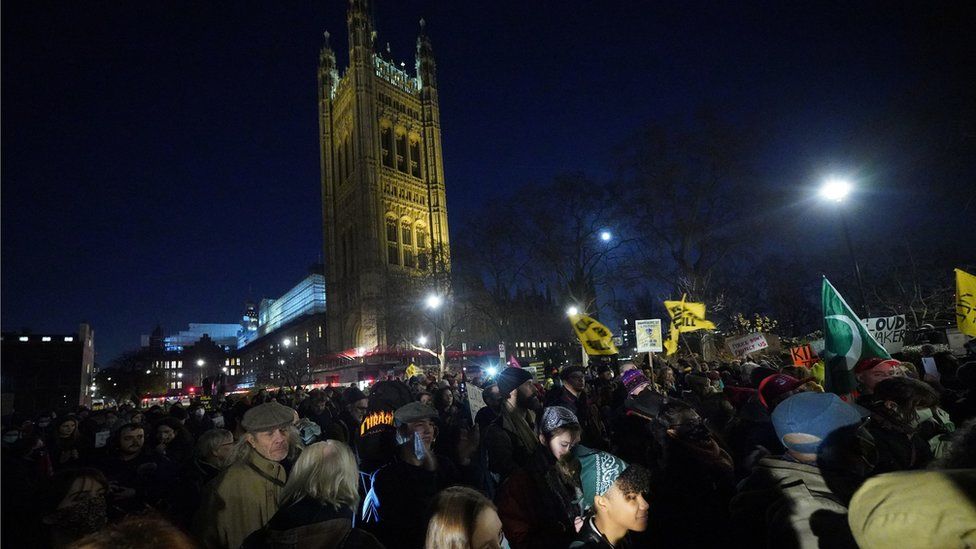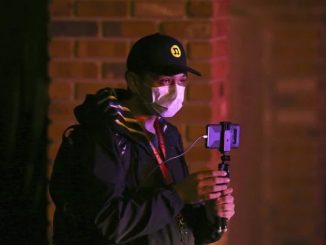
The government has suffered a series of defeats in the House of Lords over its plans to clamp down on disruptive and noisy protesters.
Opposition peers voted against a range of measures in the Police, Crime, Sentencing and Courts Bill, with Labour calling some of the plans “outrageous”.
Peers also voted to make misogyny a hate crime in England and Wales in another government defeat.
The bill will now go back to the Commons for MPs to have their say.
It cannot become law until both Houses have agreed the changes – and so the bill now faces going back and forth between the Commons and Lords until agreement is reached. The government is likely to continue fighting for its proposals.
The Police, Crime, Sentencing and Courts Bill is a huge piece of legislation that covers major proposed changes on crime and justice in England and Wales.
The most controversial part of the bill is on the planned changes to protests – which the government proposed in response to environmental activists who have blocked roads, glued themselves to trains and stopped printing presses in recent years.
The government was hoping to get the Lords to support its proposals, but in a series of votes lasting until the early hours of Tuesday morning, the Lords repeatedly voted against the government.
Ministers were defeated, by 261 votes to 166, over plans to give the police new powers to stop protests in England and Wales if they are deemed to be too noisy and disruptive.
And peers also turned down other measures which would make it illegal for protesters to lock themselves to things and to give police officers powers to stop and search people in an attempt to prevent them taking part in illegal protests.
Green peer Baroness Jones described the government’s plans as “oppressive” and “plain nasty”.
“How do you seriously think a protest is going to happen without noise?” she asked.

Labour’s Lord Hain called the move “the biggest threat to the right to dissent and the right to protest in my lifetime” adding that it would have “throttled” protests by the suffragettes.
The government’s Home Office minister in the Lords, Baroness Williams, defended the plans, telling peers that the police would only use the powers where “necessary” and “appropriate”.
She urged peers to consider the different contexts in which a noisy protest could take place.
Throughout the debate, drum noises from a demonstration against the bill could be heard in the Lords’ chamber, but the minister said no-one would try to stop that.
However, she said noisy anti-vaccination protests outside a school or nursing home were a different matter – and that police should have the powers to intervene if necessary.
“A responsible government, one that stands up for the rule of law, must also defend the rights and freedom of the law-abiding majority,” she said. “Their rights cannot and must not be trampled on by a small minority of protesters, who believe they should not be answerable to the law and should be given carte blanche to cause any amount of disruption at any cost.”
The government also suffered a defeat over a separate issue when peers voted to make misogyny a hate crime in England and Wales – a move that would enable judges to impose stronger penalties if prejudice against women is proved to be the motivation.
The proposal was added to the bill as an amendment against the government’s wishes and led by Conservative peer Baroness Newlove – a former victims’ commissioner.
Baroness Newlove said: “It is perverse that, despite three million crimes being committed against women in just three years, our legal and policing systems do not routinely recognise what we all know is blindingly obvious: the deep-rooted hostility towards women that motivates many of these crimes.
“As a society we have rightly taken steps to acknowledge the severity of racist or homophobic crimes, but have not yet acted on crimes driven by hatred of women.
“Too often when it comes to violence against women, society demands the perfect victim before we act,” she argued, adding that her amendment sought to “flip the script”.
Baroness Fox argued against the proposal, saying the data collected would be “almost entirely based on subjective perceptions” of what constituted misogyny.
She warned that police resources would be wasted if they got “tangled up in the reporting and monitoring of stats and data which I do not think is reliable”.
Home Office Minister Baroness Williams pointed to a report by the Law Commission last year which concluded that making misogyny a hate crime would not solve the problem of hostility towards women.
The amendment had support from Labour and the Liberal Democrats and it was backed by 242 votes to 185.
The list of government defeats
Peers voted against the government’s plans to:
- create a new offence of “locking on”, a tactic used by protesters to make it difficult to remove them, carrying with it a penalty of up to a year in prison
- create a new offence of obstructing the construction or maintenance of major transport works
- make it an offence for a person to interfere with the use or operation of key national infrastructure, including airports, the road network, railways and newspaper printers
- allow police officers to stop and search a person or vehicle if it was suspected an offence was planned, such as causing serious disruption or obstructing major transport works
- allow police to stop and search anyone at a protest “without suspicion”
- allow individuals with a history of causing serious disruption to be banned by the courts from attending certain protests
Peers voted for new amendments to the bill that would:
- scrap the power to impose conditions on protest marches judged to be too noisy
- protect Parliament Square as a place to protest
- require police officers to tell the truth in public inquiries
- demand an urgent review into the prevalence of drink-spiking offences
- restrict the imposition of tougher sentences for blocking a highway to major routes and motorways (rather than all roads)
- scrap the Vagrancy Act 1824, which makes it a crime to beg as well as sleep rough
- make misogyny a hate crime by giving the courts the power to treat misogyny as an aggravating factor in any crime and increase sentences accordingly
Source: bbc.co.uk






Be the first to comment